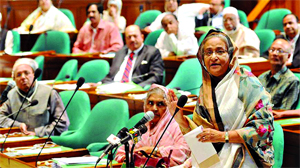Faruque Ahmed
Like the January 5 election of seat sharing, the ruling Awami League has handpicked an obedient opposition as the new parliament started its journey on January 29 to play the dubious role of member of treasury bench as well as the opposition in the House. But like the farcical election, this unusual installation of the opposition raised the question about how such a subservient opposition could play the customary role and hold the government accountable of its actions.
People watching the developments said, the country may be heading towards a period of further chaos and political rivalries in absence of an effective opposition in the House and in the streets. The loyal opposition will not held the government accountable for violations of human rights and political liberty of the citizens as it is going on across the country.
Since the opposition also can’t take to the streets to protest the government policies and actions as police prohibit them and on many occasions resort to brutal actions including fire on them, the safety and protection of political opposition may bear the brunt of the repression in absence of effective opposition.
Opposition JP on treasury bench too!
Under the new arrangement, which the new leader of the opposition and Jatiya Party (JP) alternative chairman Raushan Ershad has dubbed as a ‘new concept’ of the opposition like the caretaker government which was also unknown before it was introduced, JP MPs will sit on both the treasury bench and the opposition to play the role of a friendly opposition. Constitutional experts have termed the arrangement as unprecedented and a breach of the norms of parliamentary democratic practice.
In the House JP leader Raushan Ershad will lead the opposition bench that is responsible for holding the government accountable while its ministers will be part of the cabinet and yet sit on the opposition.
With 31 JP lawmakers, 15 independent MPs will also sit on the opposition bench. But since the independent MPs won elections with AL blessings and almost all of them are AL leaders, this raises further questions as to whether they will be able to play their role of the opposition.
Two minor political parties, BNF and Tarikat Federation, were also left solely on the opposition benches, but the two Tarikat MPs were elected on Awami League ticket using its election symbols, so they also remained subservient to the ruling party.
The lone BNF MP has also won the polls with the ruling party blessings and his position is clear.
Against such a fractured opposition,; more than 250 strong ruling party MPs will sit on the treasury benches with Prime Minister Sheikh Hasina having the absolute power to pull the string.
MPs belonging to Workers Party, Jatiya Samajtantrik Dal, Jatiya Party-Manju and three other lawmakers on treasury bench, the government will face little opposition led by Raushan in the House. Moreover, the treasury bench will become even bigger when more than 40 out of the 50 female MPs of reserved seats will join it.
Alike the Awami League-led parliament in 1973
The new system takes the nation closer to the fist Awami League-led parliament constituted in 1973 election following independence when in fact there was no recognised opposition leader in the House with only seven MPs on the opposition bench. That was also a highly controversial election when the ruling Awami League either did not allow any decent to contest the polls and the opposition candidates were defeated under the cover of threat or doctoring the election results.
The first parliament then voted to set up a one-party role in the country establishing BKSAL under the leadership of Sheikh Mujibur Rahman.
Virtual one-party rule under Hasina
People fear the nation may be moving to that direction again when the country will find it soon under a virtual one-party rule led by Sheikh Hasina this time with a subservient opposition led by the Jatiya party. The fear is widespread in the political circles. The fourth parliament then witnessed a similar subservient opposition under H M Ershad when JSD leader ASM Rab was recognised as the opposition leader. But that opposition has also some character as none of the opposition MPs joined the cabinet.
This time the JP has become part and parcel of the government joining the cabinet and also rescuing the ruling party at the same time playing the role of the docile opposition in parliament.
Sixth Parliament led by Khaleda Zia
The sixth Parliament was similarly formed [as per demand of the AL for Caretaker Government] by the BNP led by Khaleda Zia through the February 15, 1996; but was boycotted by the AL, JP and other parties. But it quickly dissolved after 11 days following the passage of the Caretaker Government and it was not challenged anyway as the breach of the parliamentary system. Only 11 MPs, including 10 independent lawmakers, were on the opposition bench that time. But none was recognised as the opposition leader.
This time the situation appears different since the government ministers are claiming that the new AL-led government formed through the January 5 controversial election will continue in office for the next five years.
Moreover, for the first time in two decades BNP is now out of parliament. The party which has boycotted the election with 18-party alliance and support from some other parties has the only job now to agitate in the streets to force the government to hold a free and fair election again under a neutral caretaker government. Thus under the new government political stability is likely to remain a far cry.
Source: Weekly Holiday










